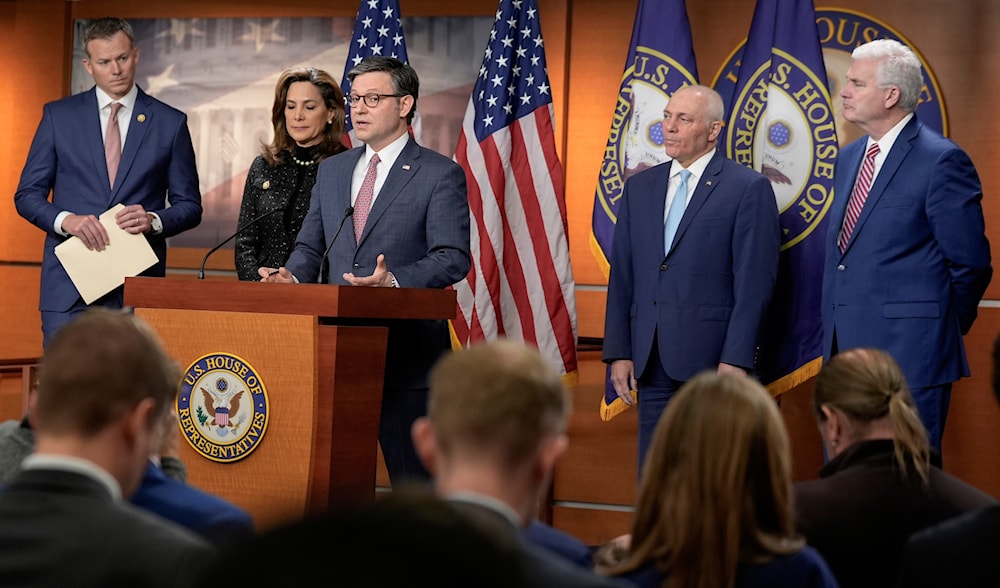Fate of US spy tool on hold amid conservatives pushback
The bill is intended to renew Section 702 of the Foreign Intelligence Surveillance Act.
-

Speaker of the House Mike Johnson, R-La., speaks during a news conference on Capitol Hill Wednesday, April 10, 2024, in Washington. (AP)
The House of Representatives in the United States witnessed quite a ruckus-filled Wednesday after the Republicans blocked a bill that would reauthorize a crucial national security surveillance program, which comes hours after former President Donald Trump called to “kill” it.
Speaker Mike Johnson said the bill was “critically important” as the vote to bring up the bill failed 193-228, with almost 20 Republicans voting no - marking a blow to Johnson as Speaker of the House.
At a press conference, he said, "It’s a critically important piece of our intelligence and law enforcement in this country." Some of Johnson’s critics, members of the ultra-conservative House Freedom Caucus, were part of those who blocked the bill.
The bill is intended to renew Section 702 of the Foreign Intelligence Surveillance Act (FISA), allowing the government to collect without a warrant communications of non-Americans for foreign intel purposes outside the US.
Rep. Marjorie Taylor Greene voiced apprehension two days ago regarding Johnson's intentions to introduce FISA, which she contends would permit "mass surveillance" of US citizens.
Read my full letter to my colleagues detailing why I filed a motion to vacate Speaker Johnson.
— Rep. Marjorie Taylor Greene🇺🇸 (@RepMTG) April 9, 2024
(1/2) https://t.co/CByvpRo8My pic.twitter.com/DWQck3WpoZ
Greene warned that if Johnson persisted in this direction, the Republican party would effectively dissolve and merge with the Democrats, leading to what she described as a "Uniparty" resulting from self-inflicted destruction.
Rep. Jim Himes of Connecticut, the top Democrat on the House Intelligence Committee, expressed to reporters how he's "just bewildered that a small number of members decided to take down the rule."
The panel’s Republican chairman, Mike Turner of Ohio, said, “There’s a great deal of misinformation about FISA,” adding, “It is not spying on Americans — in fact, that is absolutely prohibited," in an attempt to ease critics who have been vocal about civil liberty violations.
The show never stops?
Even though the program is due to expire on April 19, the Biden administration stated that collecting intelligence will remain operational for at least another year, with credit due to the Foreign Intelligence Surveillance Court, which receives surveillance applications.
As of now, it is unclear whether the proposal, backed by the Biden administration and Johnson, will pass with enough votes.
Last year, National Security Advisor Jake Sullivan said in a release that Section 702 is "a cornerstone of US national security," as well as "an invaluable tool that continues to protect Americans every day and is crucial to ensuring that US defense, intelligence, and law enforcement agencies can respond to threats from the People's Republic of China, Russia, nefarious cyber actors, terrorists, and those who seek to harm our critical infrastructure."
US officials claim that the tool, introduced in 2008, serves the purpose of disrupting terror attacks, cyber intrusions, and foreign espionage.
Trump took to Truth Social on Wednesday to allege that Section 702 was applied to spy on his presidential campaign.
“Kill FISA,” Trump said. “It was illegally used against me, and many others. They spied on my campaign.”
It is claimed that the surveillance program solely targets non-Americans abroad, but it was found that it also collects communications of American citizens when they contact targeted foreigners.
Read next: US admits to surveillance of its citizens, sparks outrage
Given the context of a series of abuses and mistakes by FBI analysts in improperly using the intelligence repository for information about Americans or others in the US, FBI Director Chris Wray explained, “While it is imperative that we ensure this critical authority of 702 does not lapse, we also must not undercut the effectiveness of this essential tool with a warrant requirement or some similar restriction, paralyzing our ability to tackle fast-moving threats."
Back in December, Congressman Matt Rosendale said that the bill "allowed the FBI to spy on U.S. citizens more than 278,000 times without a warrant! FISA should not be combined with our national defense, and it is unacceptable that the DC Cartel is bypassing regular order to jam Members by forcing them to vote on two unrelated bills in one vote."

 4 Min Read
4 Min Read








